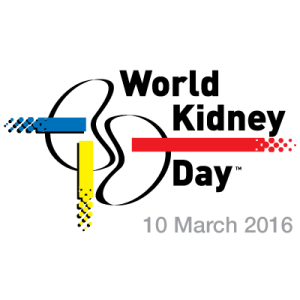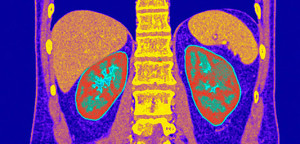Dr Helen Noble, Queens University Belfast and Sarah Hallahan, Belfast City Hospital, Northern Ireland.
Kidney problems are common. And the number of people with serious kidney problems, such as kidney disease is growing. World Kidney Day (WKD occurs annually on the 2nd Thursday in March. See; www.worldkidneyday.co.uk. On this day kidney charities, staff and patients organise events locally and nationally in order to raise awareness of the impact of kidney disease. They also highlight the importance of good kidney health in order to prevent disease.
The kidneys are essential to health and act as a filter system in the body. The primary purpose of the kidneys is to remove waste products from the blood stream before converting them into urine (NHS Choices 2014) but they also have a number of additional functions. These functions include helping to control blood pressure, producing vitamin D which helps keep the bones healthy, helping to regulate red blood cell production and maintaining the correct levels of chemicals in the body which helps the heart and muscle to function properly (Smeltzer et al 2010). Chronic kidney disease is very common and it reduces the kidney’s ability to carry out its functions efficiently. It is generally caused by damage to the kidneys from other conditions, such as diabetes and cardiovascular disease. Symptoms of the kidney disease are not usually recognised until the disease has progressed. These symptoms include fatigue, swollen ankles, blood in the urine and shortness of breath. Kidney disease is more prevalent as individuals get older. According to NHS Choices it is estimated that about one in five men and one in four women between the ages of 65 and 74 has some degree of the disease. There is still no cure for kidney disease however treatment can slow the progression of the disease. Having a healthy diet, exercising regularly, avoiding excessive amounts of alcohol and avoiding medications which can damage the kidneys can both prevent individuals from developing the kidney disease and slow or halt the progression of the disease.
Anyone can get involved in WKD. If interested there is a Support Pack which can be applied for at info@worldkidneyday.co.uk. There are also a number of resources that can be downloaded from the Campaign Materials page. These include fliers to give to those who attend your event and posters which highlight key messages related to kidney disease and how to keep the kidneys healthy. You will also find a PowerPoint aimed at children related to keeping kidneys healthy.
You can follow WKD on Facebook – https://www.facebook.com/worldkidneydayuk or Twitter – Twitter @kidneydayUK and use #worldkidneyday
Many activities can be included and you might consider:
- Organising a sports event, such as a cycle race, or a 5K run
- Using the WKD design to display work, perhaps in a school, GP waiting room or hospital.
- Host an education event or an awareness day
- Host a charity dinner or tea event
- Have a coffee morning or cake sale.
Smeltzer, C., Bare, G., Hinkle, L & Cheever, K. (2010) Brunner & Suddarth’s Textbook of Medical- Surgical Nursing, 12th edn., Philadelphia: Lippincott, Williams & Wilkins.
National Health Service-Choices (2015) Chronic Kidney Disease, Available at: http://www.nhs.uk/conditions/Kidney-disease-chronic/Pages/Introduction.aspx (Accessed: 29th February 2016).

